
*
Something sick is happening in Virginia. A normally placid neighborhood is in an uproar. There are reports of a creepy guy driving aimlessly through the suburban streets. Police are on the lookout. Gossip is in the air. Families are in conflict. Husbands vs. wives. Children vs. parents. Neighbor vs. neighbor. And songs by Bruce Hornsby.
SCKBSTD (pronounced like "sick bastard") is the show winding up its world premiere run by Virginia Stage Company in Norfolk, VA, on Feb. 6. With music and lyrics by Hornsby — the Virginian who topped the charts with "The Way It Is" in 1986, and had further pop winners like "Mandolin Rain" and "Every Little Kiss" — SCKBSTD is directed by John Rando and features several Broadway luminaries including Jill Paice, Kevin Mambo and the two gentleman I spoke to for this edition of Leading Men, Robert Cuccioli and Marcus Lovett.
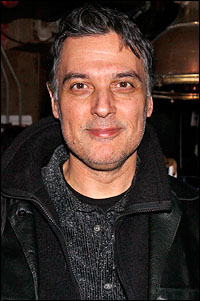 |
||
| Robert Cuccioli |
||
| photo by Joseph Marzullo/WENN |
Well, it makes you feel like a trailblazer. There's no road map. If you're working with a group of people, like fortunately I am, that are very collaborative, you have a voice in how your character would respond, how a certain scene might want to go. This show in particular all around has been that way. Bruce Hornsby is a very daring person as far as music goes and has been very flexible. John Rando's got such a creative mind and he's been very supportive with exploring different avenues. Same with the choreographer, Scott Wise.
What is it like for you to be playing such a potentially sick bastard?
Well, it's not the first, in that regard. I think the title can be up to interpretation, let's put it that way. Certainly it's the community that this individual finds himself in that spins the fantasy of creating him into a sick bastard. It's really difficult to try to explain this without giving away anything! What I can say about him is that he's a very emotionally complex individual. I find that exciting to play. Those are the kind of characters that I gravitate toward and can find myself playing for a long time.
You grew up in Long Island. Have you experienced anything of this sort of suburban paranoia in your life?
No, not really. I did grow up in suburbia, but it's not the same thing. Of course we did have our urban legends in grammar school and things like that about certain people that would be on the street.
When you were getting involved with this show, was it exciting to think about Bruce Hornsby as someone you would be collaborating with?
I grew up listening to his music, and I have loved his music. To have the chance to work with someone who I have admired for many years, it was a very exciting thing for me.
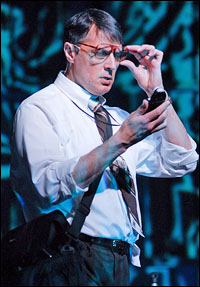 |
||
| Cuccioli in SCKBSTD |
||
| photo by David Polston |
First of all, Virginia Stage has been a godsend to work for. They can't do enough for [us]. Because we've been working so hard to develop the piece and we only opened [Jan. 21], we've been very much into rehearsals and tech and previews, and we constantly go from the living area to the theatre. There hasn't been a lot of chances to experience the community. Those locals that have been coming to the show have seemed very supportive of Virginia Stage as a company itself and also very supportive of the show, especially since their home son is one of the writers, and it takes place in this area.
What is your process in getting involved with a show like this? When you've signed on to do it, does it become 95 percent of everything you're thinking about when you're committed to it? Are you always looking for ways to make it better?
Oh yeah. You can get all consumed in it, and certainly the time commitment involved with rehearsals and previews and things like that. You're in it and constantly thinking about it. I'm constantly thinking about a certain scene or a relationship with a character or how he would deal with a certain situation. It's constantly churning in there.
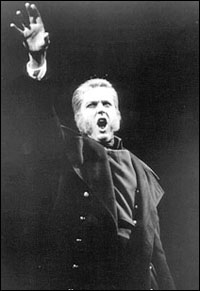 |
||
| Cuccioli in Les Miserables |
||
| photo by Joan Marcus |
That's hard to say as far as saying I have one road that I want to be on right now. I have found lately that I take a lot of different turns, and it's still the same road, but I have my fingers out. I'm spread out in a lot of different directions. I love working on new pieces, and I love starting with them in the beginning or as close to the beginning as possible and seeing it through. Sometimes that takes years for that to happen, so you obviously have to have other paths. I continue to do classic theatre and I'd love to continue with that. That just makes me better as an actor. I am trying to do more TV and film. I also have begun doing more and more of my own concert work.
Jekyll and Hyde, a great Broadway show for you. Was there a moment when you realized you were in a show that was going to alter your life?
Yeah, from the moment that I heard about the project, it was something that I wanted to be involved in. It's the same as when I first heard the music to Les Miz when I was in London still. I knew that was a project I needed to be involved in. Fortunately it worked out that that happened. But Jekyll and Hyde, I knew that was a show and a role that, if I got it, would change my life. And it did. I'm very fortunate that it all played out the way that I had hoped it would.
Were you ever in Les Miz at the same time as your SCKBSTD co-star Marcus Lovett?
No, I knew Marcus from back in '90 or '91. He came into And the World Goes 'Round. That was the first time I had met Marcus, and I think that was probably close to the last time I really saw Marcus. I sort of helped put him in to replace me, and then our careers took very different paths. I hadn't run into him since then. When I saw his name on the cast list for this, I was pleasantly surprised, like, "Oh my god, I haven't seen him forever!" It's been a great thing to reconnect with him.
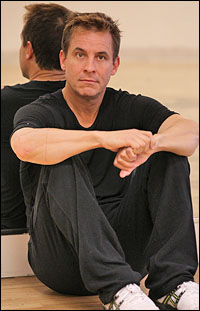 |
||
| Marcus Lovett in rehearsal for SCKBSTD |
||
| photo by Joan Marcus |
As you've read, Marcus Lovett replaced Cuccioli in a show once, so they are similar types. "We knew each other mostly from audition rooms and hallways at Chelsea Studios," Lovett said. He wrote in Cuccioli's opening night card, "What a pleasure!" And Lovett is also taking pleasure in his role as the patriarch of the suburban family menaced by Cuccioli's character in SCKBSTD. On Broadway, Lovett has starred as the Phantom and King David; he was in the opening night casts of Les Miz and Aspects of Love. The Wheaton, IL, native has done solo turns in London and Paris as well.
What attracted you to this show?
Well, Bruce Hornsby's music. He's a very interesting cat. He's got a real soulful groove to his music, and the first thing after [director] John Rando mentioned it to me, Michael Rafael, the producer, sent me the whole recorded score by Bruce. You know when you hear those Sondheim recordings of Company that they're now releasing? I've never heard a composer sing his whole score. In fact, I got to see him sing the whole score in concert as well. That's unique to have a singer and a composer write a show. I sing in various styles. I can't do everything, but from arias, or the occasional Italian or German, to Broadway, to jazz. This music was something I had not done before. It's a really particular kind of singing. That was the first thing. Then John Rando and I have worked together before. I love working with John, so that was easy. And just to get to see how everybody approaches this work. The amount of talent they bring to it — it's as good as anything I've ever been involved in, talent-wise.
What sort of function does your character play? Are you the moral center, would you say?
I think that I'm a very reasonable guy. This is a day in the life of a town. I am definitely a leader in the town. Kevin Mambo does a wonderful job as the sheriff, which could be an afterthought kind of a role if it weren't played by such a talented person. Between the two of us, we represent the heartbeat of the town. This is a really great piece for Jill Paice because she really is at the heart of the show. I play a guy that wakes up early, sneaks a cigarette, works a 14-hour day, has his son sneak out, has to stay up all night looking for him…it's a very specific journey that I get to have. In real life, I'm a father of three; I've had kids be out later than they should. I've gone through the worries of wondering if they're O.K.
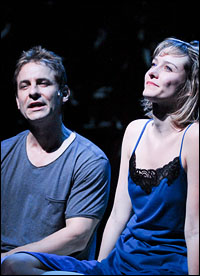 |
||
| Lovett and Jill Paice in SCKBSTD |
||
| photo by David Polston/span> |
Bruce is a partner in this, but with a very strong backbone. You can have the dictatorial composer who just tells you like it is, and you can always have a composer who completely bows out and has you bring what you bring to it. Bruce gets in the mosh-pit with you. He'll come back after a show and his notes are very specific. We'll go to a piano. My favorite thing was that he likes to loop things. As a musician, you can loop a phrase to practice it. His music requires a certain kind of singing. In a way, he was a tutor. Clay Chapman, the playwright, was right up on the stage with you saying, "Did that work for you?" You didn't have to sort through any ego issues. It was just: what's working? How much do you value original work and being involved in something at this early stage like this?
I've done plenty of replacing, and replacing is fun to a point. There are so many other people relying on you doing something similar to what's been done. They're relying on you doing what it is someone else did, approximately. In the end, if Hal Prince or Michael Crawford decided that you were going to stay at the organ for the first verse, you're going to stay at the organ. You're not given creative license. You're not involved with the creator; you're involved with the recreation. What happens in the original process is that you're standing at the organ because it worked for you while you were working with the director at that moment in time. You knew precisely what it was that you were trying to accomplish together that had you on that part of the stage at that time.
Have you ever found yourself working on an original show and purposely trying to have a moment that you know everyone will have to follow for the rest of eternity if the show goes on?
[Laughs] That's very funny. No, I've never thought of it like that. I've only done a couple of shows that I've been replaced in. I've done plenty of shows where I've been understudied, but my wish for the actor is that whomever they're working with allows them as much liberty as they can take. I did a show with Nick Hytner at Lincoln Center in '94, and I was being put into the show. Michael Hayden's voice went out and I went on in 47 hours and played Billy Bigelow. I would say to Nick, so where do I stand? And he goes, "Anywhere there's light." And when do I cross? "Anytime you want, as long as there's some light there." That kind of direction is great when you're replacing. Anytime when you get creative people who have ownership of something, being the writer, director or choreographer, or Bruce Hornsby for that matter… Bruce corrected me a lot; there were a lot of things he wanted differently about what I was doing. In my head, I said, "Marcus, Bruce is always right. He wrote it."
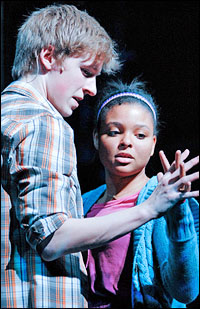 |
||
| Young SCKBSTD leads Charles Franklin and Brynn Williams |
||
| photo by David Polston |
I don't know how they're going to do this from a PR standpoint, but this is a really good show for 13 and up. To have a show called SCKBSTD, which I'm not saying shouldn't be called that, but you know, it's got a lot of humor. Any one of the three [young leads] could be a star in a month. Charles Franklin, Riley Costello, and — I'm not even looking at a program, I'm proud of myself — Brynn Williams. I'm not going to say it's a feel-good family show, but it is a show that's got a lot to enjoy for anybody over the age of 13 or 14. You maybe could even go as young as 12. I think the best song is called "Invisible." Forgive me, Bruce — I'm sure he loves all his songs — but Charles and Brynn sing that together. You listen in the wings and you want to cry. They're so talented.
You were in the original cast of Les Miz what did that mean to you at the time?
Joe Kolinski, who had been in five shows in a row that had not run, said to me, "Marcus, you know they're not all like this, right?" We were going to every Tony party and we were all invited and we were just the toast, toast, toast of the town. Joe was exactly right.
And working with Trevor Nunn?
I couldn't speak. Trevor Nunn used to call me the Quiet Man, and you can tell from this conversation that that can't possibly be true, but I couldn't speak in front of Trevor Nunn. We'd go out to dinner and I would just sit there. I would only go with the people he actually socialized with who were my friends. There would be no conversation if it was just me and Trevor.
So now can you talk to him?
Yeah, I'll talk as long as he can stand it. I don't know if he remembers the Quiet Man or not. He has a great memory, though. I auditioned for him a few years later and he said, "You are becoming everything I thought you would become the day that I met you." There's a term for it in the business that is probably a little unfriendly toward Trevor because it's so earnest on his part. It's called being "Trevored" because he's such a positive people person when he's around talent, where he'll just totally say the most wonderful things he could say about me before hiring Michael Ball for the job. [Laughs.] That happens too.
(Tom Nondorf can be reached at [email protected])(>











